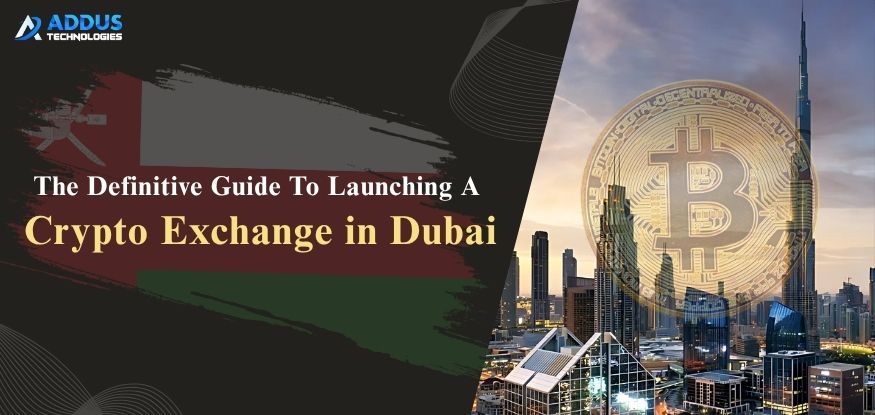The Definitive Guide to Launching a Crypto Exchange in Dubai

Dubai is becoming a hub for blockchain & cryptocurrency. Many entrepreneurs are now considering starting a crypto exchange in Dubai. But the process is not simple. You need to understand regulations, compliance and the technical side of building the platform.
If you want to build a crypto exchange in Dubai, working with a reliable crypto exchange development company is key. They can guide you through the legal process and build a secure system.
Why Dubai is Attractive for Crypto Exchange Businesses
Dubai offers a clear framework for cryptocurrency. The government supports blockchain and fintech innovation. The Dubai Multi Commodities Centre (DMCC) and the Dubai Financial Services Authority provide guidance and licenses. This makes Dubai attractive for starting a crypto exchange.
The city’s strategic location, tax benefits and strong infrastructure add to the appeal. Dubai also allows full ownership for foreign investors in many cases. This makes it easier for entrepreneurs to set up operations.
Understanding Dubai’s Crypto Regulations
Beyond the well-known rules, there are details that are less visible but matter a lot when launching a crypto exchange in Dubai:
Activity-Based Licensing Under VARA
Dubai’s Virtual Assets Regulatory Authority (VARA), created in 2022, doesn’t just issue a generic crypto exchange license. It issues licences based on which activities you want to do. custody, brokerage, exchange, lending, etc. Each has its own rulebook.
This means you need to define clearly what your exchange will support. If you add a new activity later, you may need additional permissions and compliance work. Many companies underestimate this.
Four Compulsory Rulebooks + Activity-Specific Rulebooks
All Virtual Asset Service Providers (VASPs) must follow a set of core rulebooks (e.g. company, compliance & risk management, tech & security, market conduct). Then, depending on what specific services they offer, more rulebooks apply.
Regulation in Free Zones vs Non-Free Zones
If you set up in a free zone like DMCC, there are special frameworks. For example, DMCC works with SCA or VARA depending on what you do. Business regulatory frameworks in free zones often allow faster company formation, certain tax or ownership advantages, but the regulatory oversight is still strict.
Tokenization & Real-World Asset Regulatory Focus
Dubai is pushing tokenization of real-world assets (real estate, precious metals, etc.). VARA and other authorities are defining how tokenised assets are treated under law: what counts as a security, what disclosures are needed, how ownership is recorded, what happens in disputes.
Marketing/Disclosure Obligations
There are rules about how virtual asset firms can do marketing. You must provide clear risk disclosures. You can’t mislead people. Authorities are checking promotional material more closely. Many new exchanges forget this or treat it lightly.
Enforcement & Supervision are Increasing
It’s not enough to just get a licence. Regulators in Dubai are now more active. They are doing inspections, issuing notices, even revoking permissions if you don’t stay compliant. For example, BitOasis was publicly called out by VARA for failing minimum compliance requirements.
Steps to Launch a Crypto Exchange in Dubai
Research and Plan
Start by studying the market. Understand your target audience and competitors. Decide what type of exchange you want, centralized or decentralized. Plan your budget and timeline.
Legal Setup and Licensing
Choose your business structure. Apply for the proper licenses through DMCC or DFSA. Prepare all required documents and compliance procedures. This step is critical to avoid legal issues later.
Partner with a Crypto Exchange Development Company
Choose a development partner who understands Dubai’s regulations. They can handle the technical side, including platform design, security & backend systems. They also ensure your exchange meets compliance standards.
Build the Platform
- User interface design
- Trading engine
- Wallet integration
- Security measures like two-factor authentication and encryption
Compliance and Security
Make sure your exchange meets all compliance requirements. Implement AML and KYC systems. protect user data and funds with strong encryption and regular audits.
Testing and Launch
Test your exchange thoroughly before launch. Check for bugs, performance issues, and security gaps. After testing, launch your exchange with proper marketing to attract users.
Ongoing Operations and Support
Running an exchange requires constant updates and monitoring. Work with your development company for maintenance and upgrades. Compliance is an ongoing process so keep up with regulations.
Common Challenges in Starting a Crypto Exchange in Dubai
- Navigating strict regulations and licensing requirements.
- Building a secure platform to prevent hacks and data breaches.
- Competing with established exchanges.
- Maintaining ongoing compliance.
- A strong plan and an experienced crypto exchange development company can help overcome these challenges.
Choosing the Right Crypto Exchange Development Company
A crypto exchange is complex. You need technical expertise and knowledge of Dubai’s regulatory environment. A good crypto exchange development company will:
- Provide end-to-end development
- Ensure compliance with Dubai regulations
- Build a secure, scalable exchange platform
- Offer technical support after launch
Choosing the right partner saves time and reduces risks. Look for a company with experience in Dubai’s crypto industry.
Final Thoughts
Starting a crypto exchange in Dubai is possible but requires careful planning and strict attention to regulation. The less-known parts, activity-based licensing, multiple rulebooks, marketing or disclosure obligations, enforcement — often trip up new entrants.
A good crypto exchange development company will not only build your technical platform but help you stay compliant, keep up with regulatory changes, and avoid legal pitfalls.
Addus Technologies is a crypto exchange development company with solid experience in Dubai. They know the regulatory landscape, know the rulebooks, and help with licensing, compliance, platform security and ongoing support. If you work with them, you’ll reduce your risk and increase your chances of running a successful exchange in Dubai.
